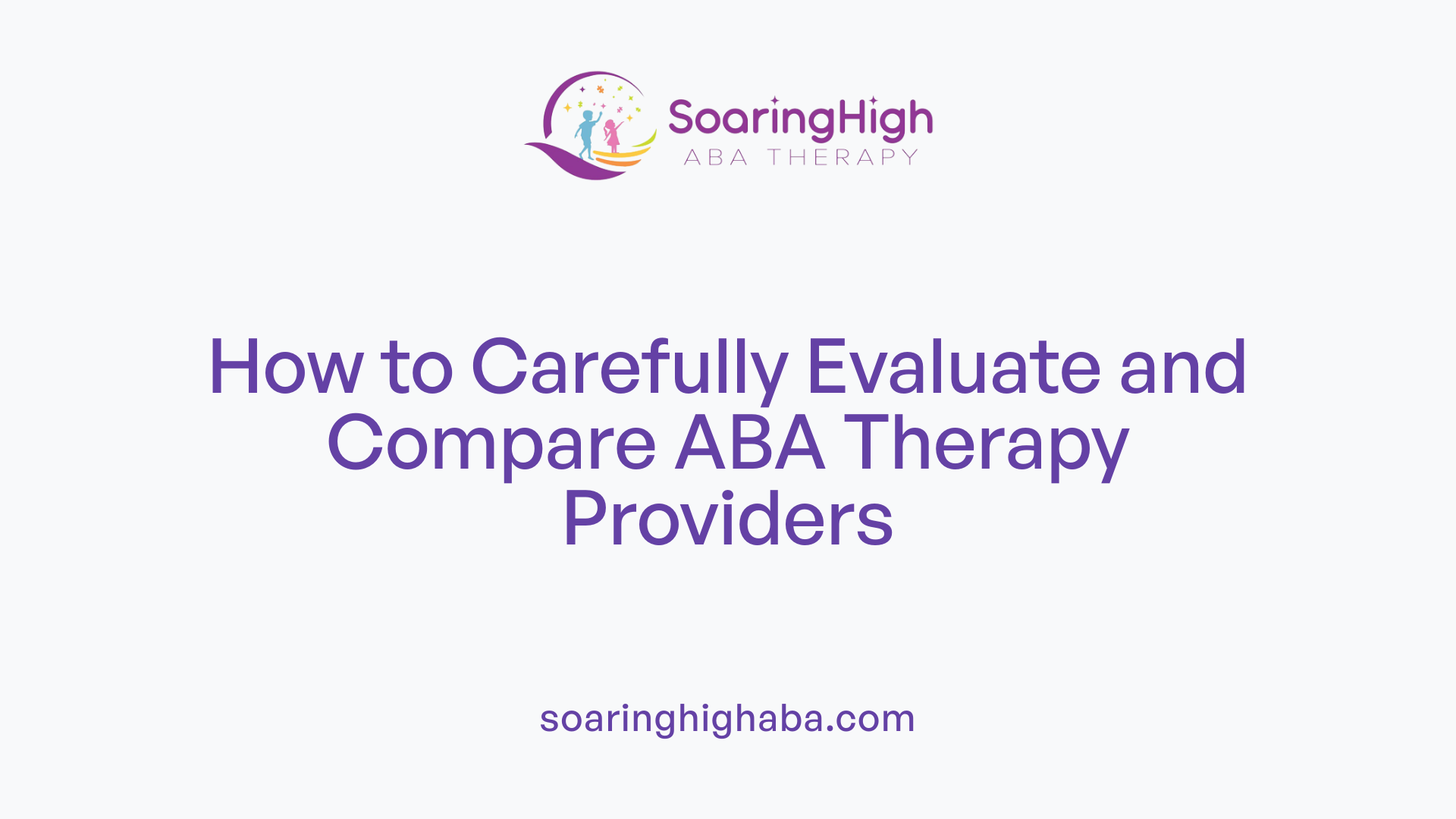Navigating Choices in ABA Therapy for Your Child
Choosing the right ABA therapy provider is a crucial decision that can significantly impact a child's development and improvement in skills. With numerous options available, parents and caregivers must consider various factors to ensure they select a provider capable of delivering individualized, evidence-based, and ethical care. This guide offers comprehensive insights into evaluating providers, understanding their approach, and making informed choices aligned with your child's unique needs.
Assessing Provider Credentials and Qualifications
 When selecting an ABA therapy provider, verifying the credentials and experience of the team is crucial for ensuring quality care. Start by confirming that all staff members hold certifications from reputable organizations, particularly the Behavior Analyst Certification Board (BACB). Key certifications include the Board Certified Behavior Analyst (BCBA), Board Certified Assistant Behavior Analyst (BCaBA), and Registered Behavior Technician (RBT). These credentials demonstrate that the practitioners meet the industry standards for education, training, and supervised experience.
When selecting an ABA therapy provider, verifying the credentials and experience of the team is crucial for ensuring quality care. Start by confirming that all staff members hold certifications from reputable organizations, particularly the Behavior Analyst Certification Board (BACB). Key certifications include the Board Certified Behavior Analyst (BCBA), Board Certified Assistant Behavior Analyst (BCaBA), and Registered Behavior Technician (RBT). These credentials demonstrate that the practitioners meet the industry standards for education, training, and supervised experience.
It's also essential to verify that providers comply with state licensing requirements and conduct thorough background checks on their staff. These steps help ensure that the team is qualified, competent, and adheres to safety and ethical standards.
Reviewing the educational backgrounds and ongoing professional development of therapists adds another layer of confidence. Look for providers whose team members have relevant degrees in psychology, education, or behavior analysis, complemented by coursework and practical experience in ABA principles. Continuing education efforts reflect a commitment to staying current with emerging research and best practices.
Questions to ask during your assessment include:
- Are your staff certified by the BACB, and what are their specific credentials?
- Do your therapists have relevant degrees and supervised practical experience?
- Is the team licensed according to regional requirements?
- Can you provide information on background checks and safety policies?
Reviewing these aspects helps ensure the provider is well-qualified and capable of delivering effective, individualized ABA therapy tailored to your child's needs.
Understanding Treatment Approaches and Personalization

How can I understand different therapeutic styles and approaches in ABA?
Recognizing the variety of strategies within ABA therapy helps ensure that your child's individual needs are met effectively. Common approaches include Discrete Trial Training (DTT), Natural Environment Teaching (NET), and Pivotal Response Training (PRT). DTT is highly structured, involving repetitive exercises designed to teach specific skills through clear prompts and reinforcement. In contrast, NET and PRT focus on learning through play and real-life situations, promoting motivation and social engagement.
All these techniques are rooted in the core principles of operant conditioning, emphasizing positive reinforcement to encourage desired behaviors. Therapists—especially BCBAs and RBTs—design personalized programs that may incorporate visual aids, sounds, or physical activities aligned with the child's learning style.
Understanding these styles involves appreciating that ABA is adaptable and evidence-based, tailored to help children develop skills across various settings. The techniques chosen should reflect your child's unique goals, preferences, and strengths, fostering an engaging and effective learning experience.
What criteria should be used to evaluate ABA therapy programs?
When selecting an ABA program, focus on how well the curriculum aligns with your child's needs. An effective program begins with detailed assessments that pinpoint the child's abilities and challenges, leading to personalized goals—such as communication, social skills, or independence.
Progress monitoring through consistent data collection is fundamental. This allows therapists to track improvement, adjust strategies, and ensure steady growth. Look for programs that use scientific, evidence-based methods like reinforcement, functional behavior analysis, and skill generalization across environments.
In addition, involve your family in the process, confirming that the program emphasizes naturalistic learning and encourages your active participation. Overall, a good ABA program is flexible, data-driven, and committed to meaningful, lasting skills that enable your child to thrive in everyday life.
Factors Influencing the Quality of ABA Care

What factors influence the quality of ABA care?
The quality of ABA therapy hinges on several critical elements that work together to ensure effective and personalized intervention for children with autism. Foremost among these are the qualifications and experience of the therapy team. A high-standard provider employs licensed professionals such as Board Certified Behavior Analysts (BCBAs) and Registered Behavior Technicians (RBTs), who follow rigorous ethical and evidence-based practices. Their thorough training and ongoing education are indicative of a commitment to quality.
Beyond credentials, adherence to scientifically supported methods is essential. This means implementing individualized treatment plans based on comprehensive functional assessments, with continuous data collection to monitor progress. Effective programs also involve active parental involvement, which empowers families and aligns therapy with the child's natural environment.
Organizational factors play a significant role as well. These include staff-to-child ratios, safety protocols, and systems for quality assurance, often guided by concepts like metacontingencies—criteria that shape organizational outcomes through collective behavior.
External factors such as caregiver education, socioeconomic status, and the families’ cultural beliefs influence how therapy is accessed and perceived. Services tailored to the child's unique needs, developed through a collaborative process involving families and educators, promote successful skill acquisition.
In summary, high-quality ABA care depends on qualified, experienced staff, evidence-based and individualized approaches, strong organizational systems, and collaborative family engagement, all directed toward optimizing outcomes for children and their families.
What criteria should be used to evaluate ABA therapy providers?
When selecting an ABA provider, parents should look for certain indicators of quality and reliability. Key among these are the credentials of the staff. A reputable provider employs BCBAs and RBTs who have met strict certification standards, including coursework, supervised experience, and state licensing, ensuring competence in their practice.
Evidence-based practice is vital; the provider should develop personalized treatment plans based on detailed assessments and grounded in current scientific research. These plans should be flexible and regularly updated as the child progresses.
Credentialing organizations like the Behavioral Health Center of Excellence (BHCOE) provide external validation, certifying programs that meet high standards of quality, safety, and ethical practice.
Furthermore, high-quality providers emphasize clear, ongoing communication with families, cultural competence, and safety policies. They involve parents actively in planning and decision-making, respecting the child's unique background and needs.
Finally, assessing program outcomes, parent satisfaction, and the organization’s ability to maintain continuity of care are crucial. Families should also verify licensing and insurance compliance, ensuring legal standards are met and financial arrangements are transparent.
In conclusion, evaluating ABA therapy services requires attention to credentials, evidence-based practices, organizational accreditation, family engagement, and safety policies—factors that collectively determine the effectiveness and integrity of the care provided.
Evaluating and Comparing Providers Effectively
 When choosing an ABA therapy provider, it’s crucial to consider several factors to ensure the best fit for your child's needs. One effective way to evaluate is by checking reviews, success rates, and parental feedback. Online directories, local support groups, and insurance listings can offer initial options, but observing therapy sessions provides a more in-depth perspective. Watching how therapists interact, engage children, and follow safety protocols can reveal much about their approach and professionalism.
When choosing an ABA therapy provider, it’s crucial to consider several factors to ensure the best fit for your child's needs. One effective way to evaluate is by checking reviews, success rates, and parental feedback. Online directories, local support groups, and insurance listings can offer initial options, but observing therapy sessions provides a more in-depth perspective. Watching how therapists interact, engage children, and follow safety protocols can reveal much about their approach and professionalism.
Parental involvement in assessing providers is equally important. Asking questions about staff credentials, experience, and supervision helps confirm whether the team maintains high standards. Consider scheduling trial sessions, where possible, to observe the therapy environment directly. Feedback from other families can give insights into the provider’s communication style, responsiveness, and overall effectiveness.
Location, availability, and costs are practical considerations. Ensure the therapy sessions fit into your family’s schedule and that the provider accepts your insurance or offers transparent billing. It’s also worthwhile to inquire about their policy on treatment goals, transition planning, and ongoing support for families.
Questions to Ask When Comparing ABA Centers
| Aspect | What To Look For | Why It Matters |
|---|---|---|
| Staff Credentials | BCBA certification, experience, ongoing training | Ensures qualified, knowledgeable staff |
| Treatment Approach | Evidence-based practices, naturalistic methods | Effective, individualized interventions |
| Program Outcomes | Success rates, BCBA exam pass rates, client progress | Indicates program quality and effectiveness |
| Supervision & Data Collection | Regular oversight, transparent data sharing | Maintains therapy quality and monitors progress |
| Family Involvement | Participation in goals, training, feedback | Boosts treatment success and relevance |
| Cost & Insurance | Clear billing practices, coverage options | Affordable, sustainable therapy |
| Observation & Trial | Visit sessions, assess comfort and interaction | Directly evaluates therapy quality |
By thoroughly evaluating these aspects, parents can identify providers that align with their child’s needs and family values.
More Resources to Research
Search phrases like 'Evaluating ABA centers and comparing providers' to find detailed checklists, expert advice, and local options. Taking the time to research and observe helps ensure the therapy chosen is safe, ethical, and effective, ultimately supporting your child's development journey.
The Role of Parental Involvement and Effective Communication

What is the importance of parental involvement and communication in ABA therapy?
Parental involvement and communication are vital for the success of ABA therapy for children with autism. When parents actively participate, they help reinforce the skills learned during therapy sessions at home, leading to better generalization of those skills across different settings. This continuous reinforcement is essential for long-term progress.
Open and clear communication with therapists fosters a collaborative environment. It allows parents to receive tailored advice, understand therapy goals, and make informed decisions about their child’s intervention plan. Transparency and ongoing dialogue build trust, making parents feel more confident in supporting their child's development.
Furthermore, involving parents in the process helps to identify what behaviors and skills are most meaningful to the family. It increases motivation and consistency, which are crucial for achieving meaningful outcomes. With proper training and resources, parents can become effective partners, contributing to more rapid and sustained improvements.
Research highlights that children benefit greatly when therapy is complemented by active parental engagement. Overall, dedicated parent participation and open communication create a supportive network that enhances the effectiveness of ABA interventions.
Choosing the Right Provider and Ensuring Ethical Standards
 When selecting an ABA therapy provider, parents should carefully evaluate various criteria to ensure high-quality, ethical care for their child.
When selecting an ABA therapy provider, parents should carefully evaluate various criteria to ensure high-quality, ethical care for their child.
What criteria should be used to evaluate ABA therapy providers?
A thorough assessment includes verifying that the provider employs qualified professionals, such as Board Certified Behavior Analysts (BCBAs) and Registered Behavior Technicians (RBTs), who meet specific educational and credentialing standards. It is also important to confirm that the provider adheres to licensing requirements and follows ethical guidelines set by the Behavior Analyst Certification Board (BACB).
Effective programs are individualized, built on comprehensive assessments like functional behavior analyses, ensuring interventions are tailored to the child's specific needs. External accreditation from organizations such as the Behavioral Health Center of Excellence (BHCOE) can further validate the provider's quality standards.
Parents should also consider the experience and track record of the staff, the clarity of communication about goals and progress, and the consistency of care given staff turnover rates.
How can I ensure transparency and ethical standards in ABA service providers?
Transparency begins with asking providers specific questions about safety policies, staff backgrounds, and certification status. Providers should readily share details about their practice standards, including how they collect and report data, use reinforcement strategies, and handle emergencies.
Ensure staff are licensed or certified, and that they follow professional practices endorsed by the BACB. Clear communication about fees, insurance processing, and treatment strategies helps build trust and understanding. Observing therapy sessions can offer insights into how therapists interact with children, their adherence to safety protocols, and the overall environment.
Parents should feel comfortable asking about staff training, safety procedures, and how progress is monitored and reported. A reputable provider will prioritize ethical standards, avoid exaggerated claims, and emphasize the child's safety and well-being at all times.
Ultimately, conducting diligent research and maintaining open dialogue with providers enables families to select a trustworthy ABA service that aligns with their values and their child's developmental needs.
Making an Informed and Confident Choice
Selecting the right ABA therapy provider is a multifaceted process that requires careful assessment of credentials, treatment approaches, parental involvement policies, and ethical standards. By understanding the various therapeutic styles, asking the right questions, and actively participating in the decision-making process, parents can ensure they choose a provider best suited to their child's needs. Remember to observe sessions, review progress data, and prioritize providers who respect your family’s values, foster open communication, and uphold the highest standards of safety and professionalism. An informed choice not only empowers families but also sets the stage for meaningful, effective therapy that can enhance your child's quality of life and developmental progress.
References
- A Guide to Selecting an ABA Provider for Your Child
- Questions to ask an ABA therapist
- Tips for Choosing a Provider for Applied Behavior Analysis ...
- What to Look For When Choosing an ABA Therapist
- Ultimate Guide To Choosing The Right ABA Therapy For ...
- The Ultimate Guide to Selecting the Right ABA Therapy ...
- 7 Questions to Ask When Choosing an ABA Therapy Provider
- 6 Essential Factors to Consider When Choosing an ABA ...
- A Parent's Guide to Picking the Right ABA Therapy Provider





































































































